Operational Management Skills for Healthcare Practice Report
VerifiedAdded on 2021/02/19
|13
|3135
|21
Report
AI Summary
This report delves into the essential operational management skills required for effective healthcare practice, specifically within the National Health Service (NHS). It begins by outlining the roles and responsibilities of an operational manager, emphasizing the importance of various personal skills in leadership, and includes a SWOT analysis of the author's role. The report then explores the applicability of different leadership theories, such as Great Man, Trait, Contingency, and Participative theories, and their relevance in the healthcare environment. Task 2 then provides a detailed analysis of these theories and their implications for conflict management. The report concludes with a proposed plan for changes within the NHS, detailing implementation strategies and recommendations for improvement. The report covers aspects like emotional intelligence, technological management, and communication skills. The report's structure includes an introduction, main body with tasks, and conclusion with references.
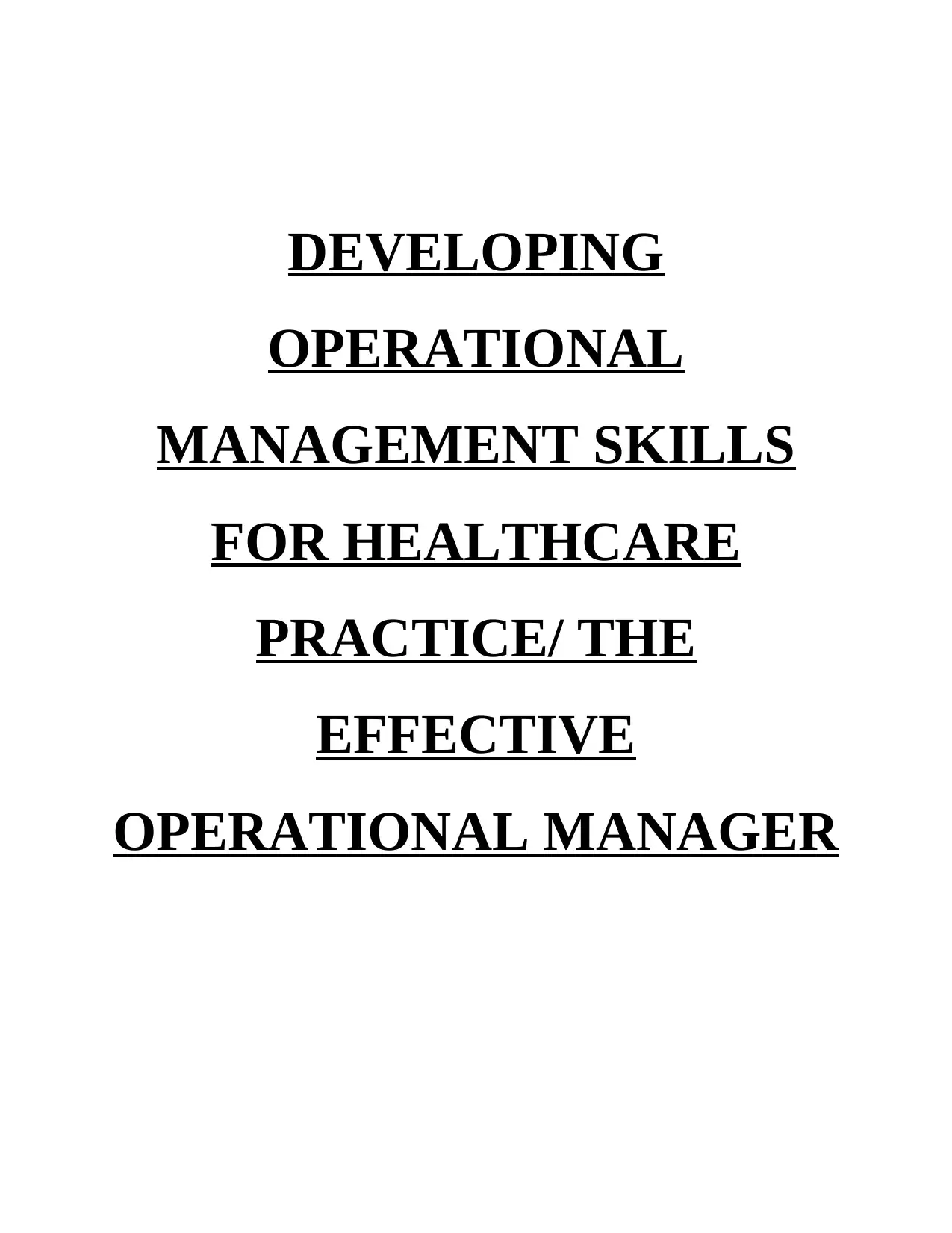
DEVELOPING
OPERATIONAL
MANAGEMENT SKILLS
FOR HEALTHCARE
PRACTICE/ THE
EFFECTIVE
OPERATIONAL MANAGER
OPERATIONAL
MANAGEMENT SKILLS
FOR HEALTHCARE
PRACTICE/ THE
EFFECTIVE
OPERATIONAL MANAGER
Paraphrase This Document
Need a fresh take? Get an instant paraphrase of this document with our AI Paraphraser
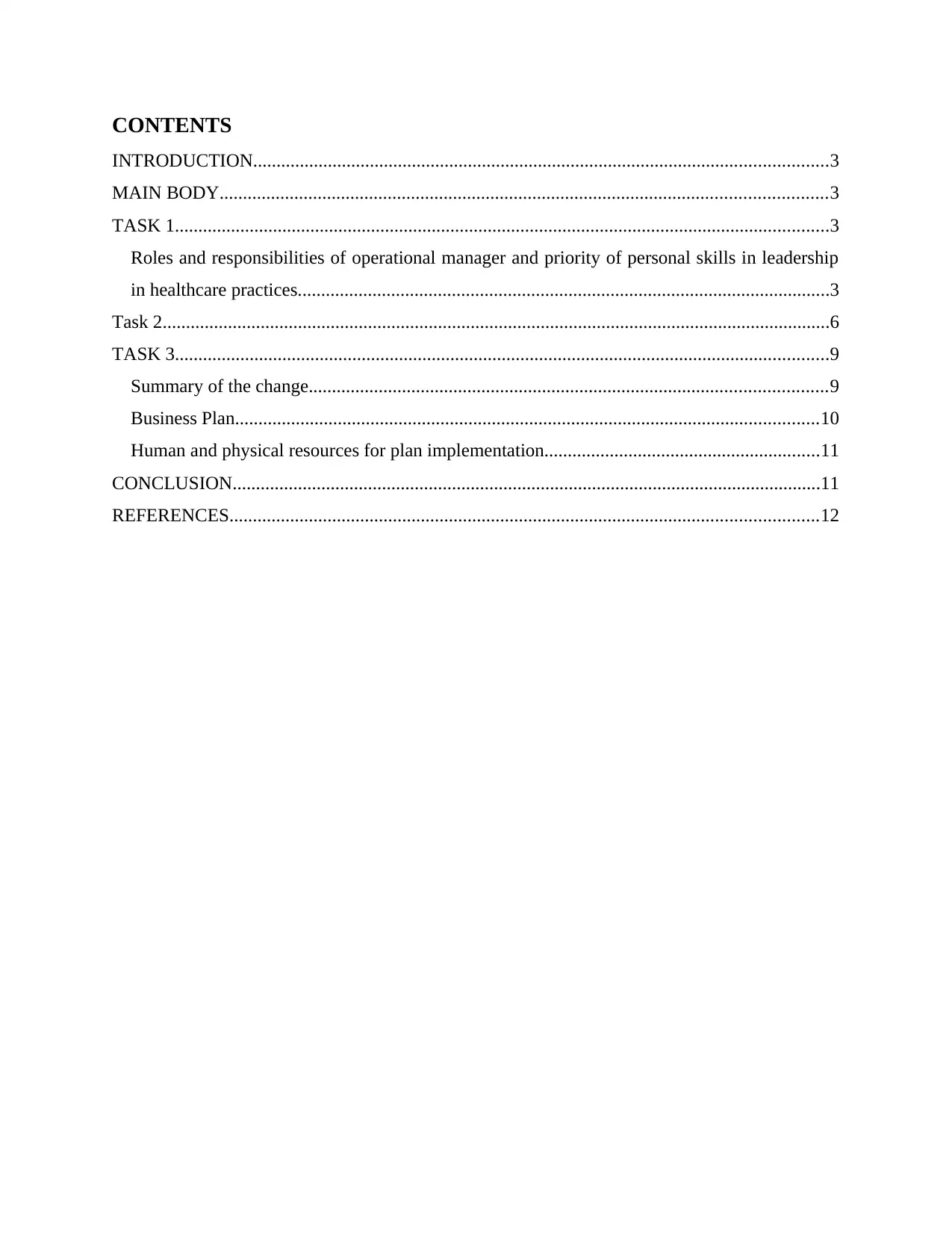
CONTENTS
INTRODUCTION...........................................................................................................................3
MAIN BODY..................................................................................................................................3
TASK 1............................................................................................................................................3
Roles and responsibilities of operational manager and priority of personal skills in leadership
in healthcare practices..................................................................................................................3
Task 2...............................................................................................................................................6
TASK 3............................................................................................................................................9
Summary of the change...............................................................................................................9
Business Plan.............................................................................................................................10
Human and physical resources for plan implementation...........................................................11
CONCLUSION..............................................................................................................................11
REFERENCES..............................................................................................................................12
INTRODUCTION...........................................................................................................................3
MAIN BODY..................................................................................................................................3
TASK 1............................................................................................................................................3
Roles and responsibilities of operational manager and priority of personal skills in leadership
in healthcare practices..................................................................................................................3
Task 2...............................................................................................................................................6
TASK 3............................................................................................................................................9
Summary of the change...............................................................................................................9
Business Plan.............................................................................................................................10
Human and physical resources for plan implementation...........................................................11
CONCLUSION..............................................................................................................................11
REFERENCES..............................................................................................................................12
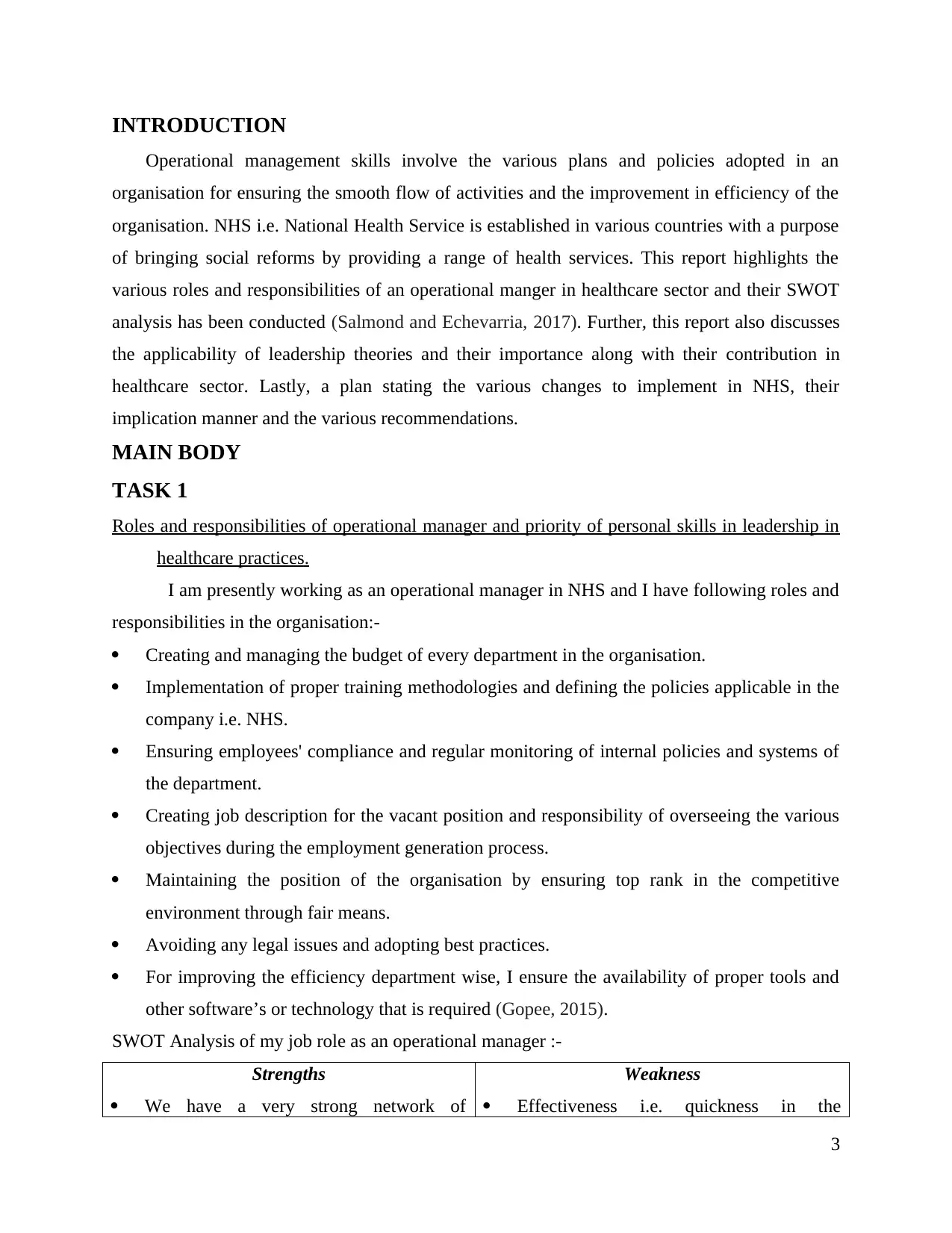
INTRODUCTION
Operational management skills involve the various plans and policies adopted in an
organisation for ensuring the smooth flow of activities and the improvement in efficiency of the
organisation. NHS i.e. National Health Service is established in various countries with a purpose
of bringing social reforms by providing a range of health services. This report highlights the
various roles and responsibilities of an operational manger in healthcare sector and their SWOT
analysis has been conducted (Salmond and Echevarria, 2017). Further, this report also discusses
the applicability of leadership theories and their importance along with their contribution in
healthcare sector. Lastly, a plan stating the various changes to implement in NHS, their
implication manner and the various recommendations.
MAIN BODY
TASK 1
Roles and responsibilities of operational manager and priority of personal skills in leadership in
healthcare practices.
I am presently working as an operational manager in NHS and I have following roles and
responsibilities in the organisation:-
Creating and managing the budget of every department in the organisation.
Implementation of proper training methodologies and defining the policies applicable in the
company i.e. NHS.
Ensuring employees' compliance and regular monitoring of internal policies and systems of
the department.
Creating job description for the vacant position and responsibility of overseeing the various
objectives during the employment generation process.
Maintaining the position of the organisation by ensuring top rank in the competitive
environment through fair means.
Avoiding any legal issues and adopting best practices.
For improving the efficiency department wise, I ensure the availability of proper tools and
other software’s or technology that is required (Gopee, 2015).
SWOT Analysis of my job role as an operational manager :-
Strengths
We have a very strong network of
Weakness
Effectiveness i.e. quickness in the
3
Operational management skills involve the various plans and policies adopted in an
organisation for ensuring the smooth flow of activities and the improvement in efficiency of the
organisation. NHS i.e. National Health Service is established in various countries with a purpose
of bringing social reforms by providing a range of health services. This report highlights the
various roles and responsibilities of an operational manger in healthcare sector and their SWOT
analysis has been conducted (Salmond and Echevarria, 2017). Further, this report also discusses
the applicability of leadership theories and their importance along with their contribution in
healthcare sector. Lastly, a plan stating the various changes to implement in NHS, their
implication manner and the various recommendations.
MAIN BODY
TASK 1
Roles and responsibilities of operational manager and priority of personal skills in leadership in
healthcare practices.
I am presently working as an operational manager in NHS and I have following roles and
responsibilities in the organisation:-
Creating and managing the budget of every department in the organisation.
Implementation of proper training methodologies and defining the policies applicable in the
company i.e. NHS.
Ensuring employees' compliance and regular monitoring of internal policies and systems of
the department.
Creating job description for the vacant position and responsibility of overseeing the various
objectives during the employment generation process.
Maintaining the position of the organisation by ensuring top rank in the competitive
environment through fair means.
Avoiding any legal issues and adopting best practices.
For improving the efficiency department wise, I ensure the availability of proper tools and
other software’s or technology that is required (Gopee, 2015).
SWOT Analysis of my job role as an operational manager :-
Strengths
We have a very strong network of
Weakness
Effectiveness i.e. quickness in the
3
⊘ This is a preview!⊘
Do you want full access?
Subscribe today to unlock all pages.

Trusted by 1+ million students worldwide
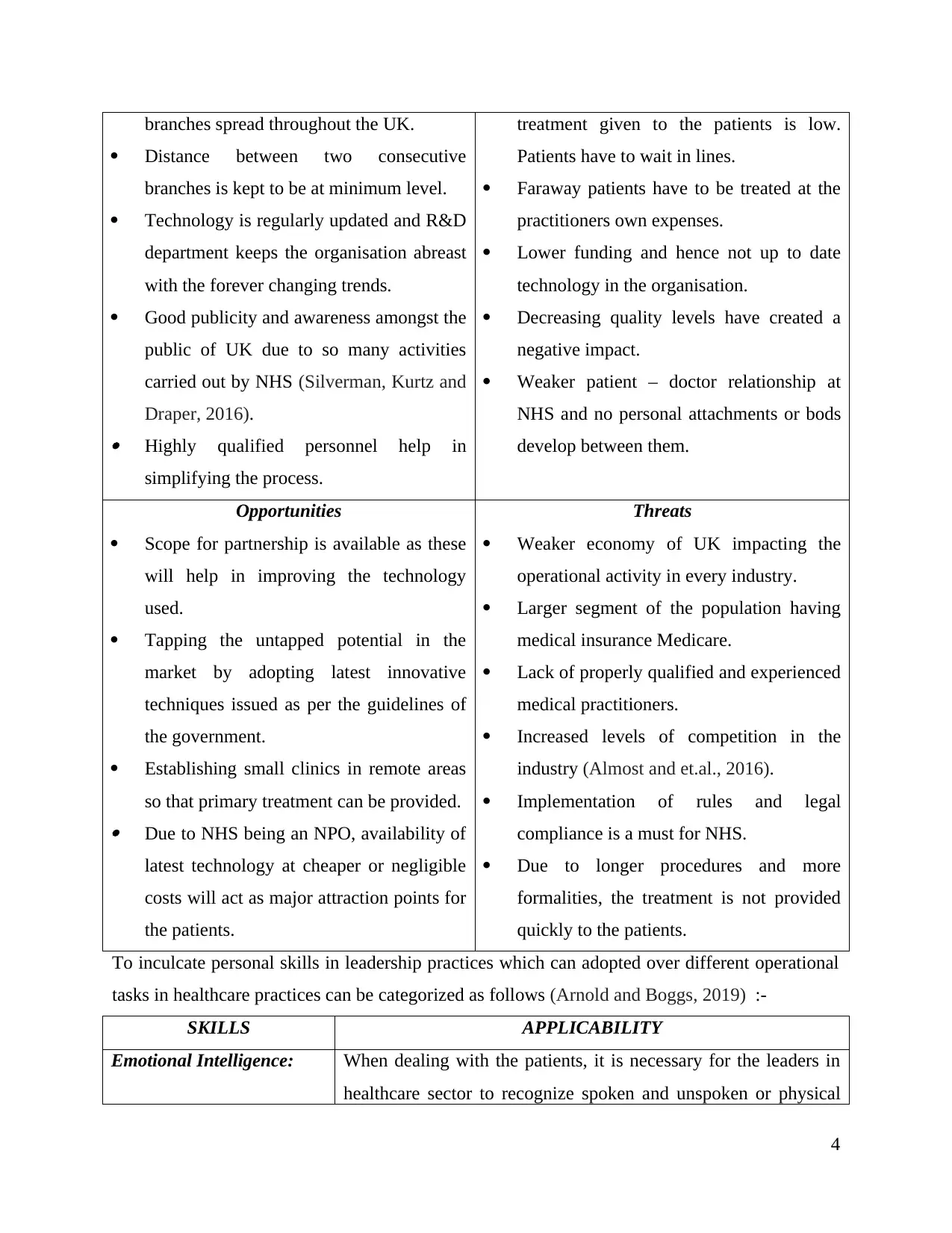
branches spread throughout the UK.
Distance between two consecutive
branches is kept to be at minimum level.
Technology is regularly updated and R&D
department keeps the organisation abreast
with the forever changing trends.
Good publicity and awareness amongst the
public of UK due to so many activities
carried out by NHS (Silverman, Kurtz and
Draper, 2016). Highly qualified personnel help in
simplifying the process.
treatment given to the patients is low.
Patients have to wait in lines.
Faraway patients have to be treated at the
practitioners own expenses.
Lower funding and hence not up to date
technology in the organisation.
Decreasing quality levels have created a
negative impact.
Weaker patient – doctor relationship at
NHS and no personal attachments or bods
develop between them.
Opportunities
Scope for partnership is available as these
will help in improving the technology
used.
Tapping the untapped potential in the
market by adopting latest innovative
techniques issued as per the guidelines of
the government.
Establishing small clinics in remote areas
so that primary treatment can be provided. Due to NHS being an NPO, availability of
latest technology at cheaper or negligible
costs will act as major attraction points for
the patients.
Threats
Weaker economy of UK impacting the
operational activity in every industry.
Larger segment of the population having
medical insurance Medicare.
Lack of properly qualified and experienced
medical practitioners.
Increased levels of competition in the
industry (Almost and et.al., 2016).
Implementation of rules and legal
compliance is a must for NHS.
Due to longer procedures and more
formalities, the treatment is not provided
quickly to the patients.
To inculcate personal skills in leadership practices which can adopted over different operational
tasks in healthcare practices can be categorized as follows (Arnold and Boggs, 2019) :-
SKILLS APPLICABILITY
Emotional Intelligence: When dealing with the patients, it is necessary for the leaders in
healthcare sector to recognize spoken and unspoken or physical
4
Distance between two consecutive
branches is kept to be at minimum level.
Technology is regularly updated and R&D
department keeps the organisation abreast
with the forever changing trends.
Good publicity and awareness amongst the
public of UK due to so many activities
carried out by NHS (Silverman, Kurtz and
Draper, 2016). Highly qualified personnel help in
simplifying the process.
treatment given to the patients is low.
Patients have to wait in lines.
Faraway patients have to be treated at the
practitioners own expenses.
Lower funding and hence not up to date
technology in the organisation.
Decreasing quality levels have created a
negative impact.
Weaker patient – doctor relationship at
NHS and no personal attachments or bods
develop between them.
Opportunities
Scope for partnership is available as these
will help in improving the technology
used.
Tapping the untapped potential in the
market by adopting latest innovative
techniques issued as per the guidelines of
the government.
Establishing small clinics in remote areas
so that primary treatment can be provided. Due to NHS being an NPO, availability of
latest technology at cheaper or negligible
costs will act as major attraction points for
the patients.
Threats
Weaker economy of UK impacting the
operational activity in every industry.
Larger segment of the population having
medical insurance Medicare.
Lack of properly qualified and experienced
medical practitioners.
Increased levels of competition in the
industry (Almost and et.al., 2016).
Implementation of rules and legal
compliance is a must for NHS.
Due to longer procedures and more
formalities, the treatment is not provided
quickly to the patients.
To inculcate personal skills in leadership practices which can adopted over different operational
tasks in healthcare practices can be categorized as follows (Arnold and Boggs, 2019) :-
SKILLS APPLICABILITY
Emotional Intelligence: When dealing with the patients, it is necessary for the leaders in
healthcare sector to recognize spoken and unspoken or physical
4
Paraphrase This Document
Need a fresh take? Get an instant paraphrase of this document with our AI Paraphraser
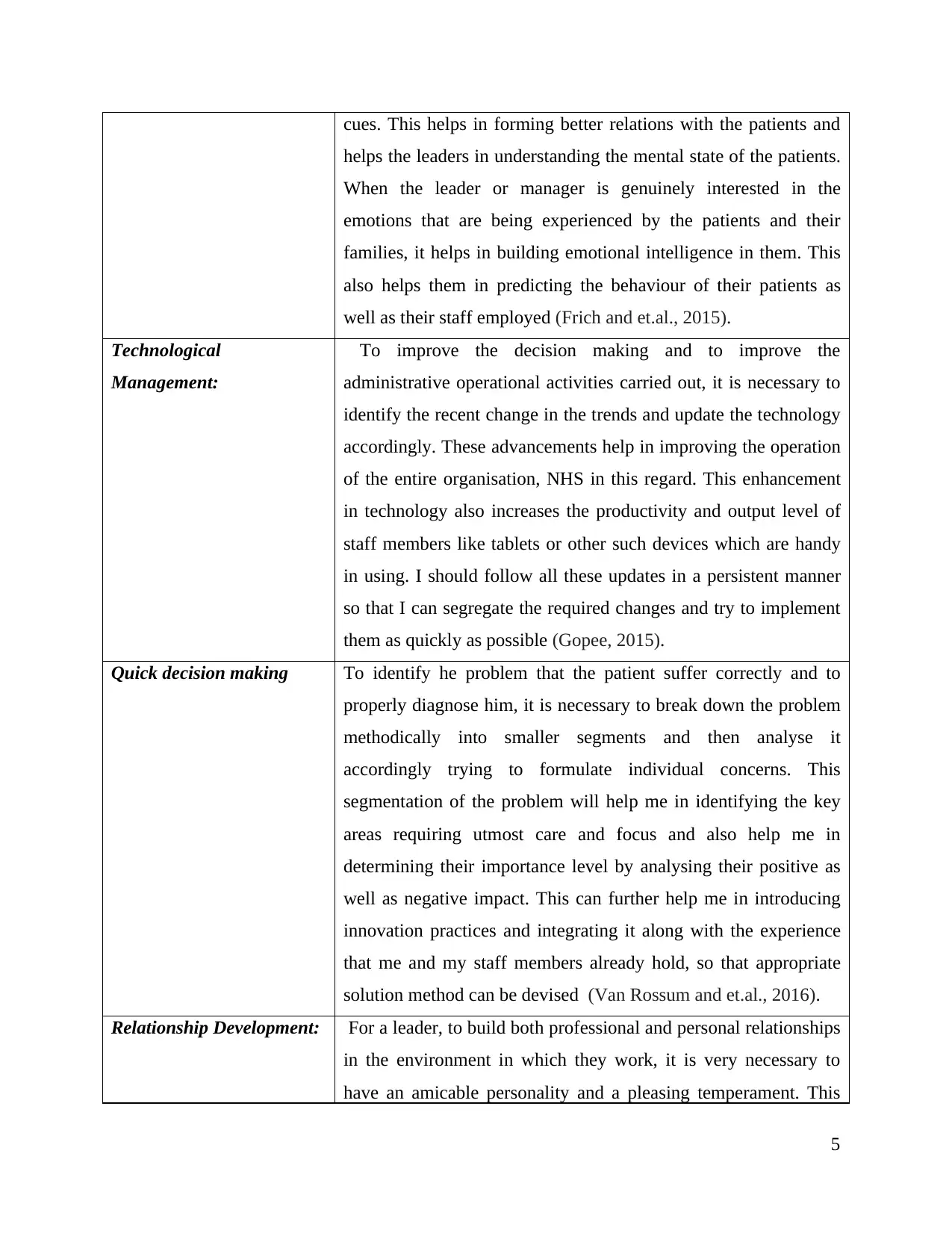
cues. This helps in forming better relations with the patients and
helps the leaders in understanding the mental state of the patients.
When the leader or manager is genuinely interested in the
emotions that are being experienced by the patients and their
families, it helps in building emotional intelligence in them. This
also helps them in predicting the behaviour of their patients as
well as their staff employed (Frich and et.al., 2015).
Technological
Management:
To improve the decision making and to improve the
administrative operational activities carried out, it is necessary to
identify the recent change in the trends and update the technology
accordingly. These advancements help in improving the operation
of the entire organisation, NHS in this regard. This enhancement
in technology also increases the productivity and output level of
staff members like tablets or other such devices which are handy
in using. I should follow all these updates in a persistent manner
so that I can segregate the required changes and try to implement
them as quickly as possible (Gopee, 2015).
Quick decision making To identify he problem that the patient suffer correctly and to
properly diagnose him, it is necessary to break down the problem
methodically into smaller segments and then analyse it
accordingly trying to formulate individual concerns. This
segmentation of the problem will help me in identifying the key
areas requiring utmost care and focus and also help me in
determining their importance level by analysing their positive as
well as negative impact. This can further help me in introducing
innovation practices and integrating it along with the experience
that me and my staff members already hold, so that appropriate
solution method can be devised (Van Rossum and et.al., 2016).
Relationship Development: For a leader, to build both professional and personal relationships
in the environment in which they work, it is very necessary to
have an amicable personality and a pleasing temperament. This
5
helps the leaders in understanding the mental state of the patients.
When the leader or manager is genuinely interested in the
emotions that are being experienced by the patients and their
families, it helps in building emotional intelligence in them. This
also helps them in predicting the behaviour of their patients as
well as their staff employed (Frich and et.al., 2015).
Technological
Management:
To improve the decision making and to improve the
administrative operational activities carried out, it is necessary to
identify the recent change in the trends and update the technology
accordingly. These advancements help in improving the operation
of the entire organisation, NHS in this regard. This enhancement
in technology also increases the productivity and output level of
staff members like tablets or other such devices which are handy
in using. I should follow all these updates in a persistent manner
so that I can segregate the required changes and try to implement
them as quickly as possible (Gopee, 2015).
Quick decision making To identify he problem that the patient suffer correctly and to
properly diagnose him, it is necessary to break down the problem
methodically into smaller segments and then analyse it
accordingly trying to formulate individual concerns. This
segmentation of the problem will help me in identifying the key
areas requiring utmost care and focus and also help me in
determining their importance level by analysing their positive as
well as negative impact. This can further help me in introducing
innovation practices and integrating it along with the experience
that me and my staff members already hold, so that appropriate
solution method can be devised (Van Rossum and et.al., 2016).
Relationship Development: For a leader, to build both professional and personal relationships
in the environment in which they work, it is very necessary to
have an amicable personality and a pleasing temperament. This
5
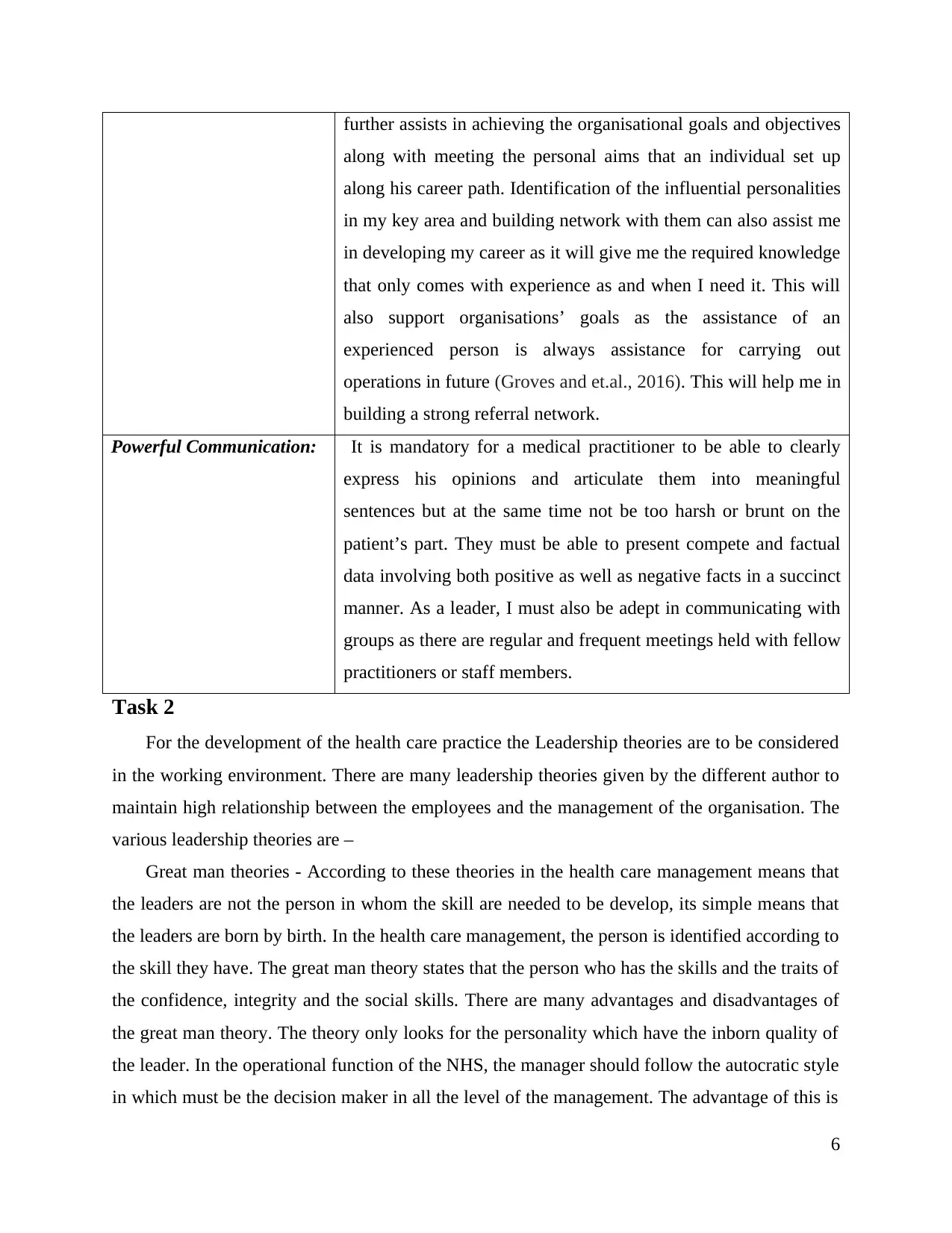
further assists in achieving the organisational goals and objectives
along with meeting the personal aims that an individual set up
along his career path. Identification of the influential personalities
in my key area and building network with them can also assist me
in developing my career as it will give me the required knowledge
that only comes with experience as and when I need it. This will
also support organisations’ goals as the assistance of an
experienced person is always assistance for carrying out
operations in future (Groves and et.al., 2016). This will help me in
building a strong referral network.
Powerful Communication: It is mandatory for a medical practitioner to be able to clearly
express his opinions and articulate them into meaningful
sentences but at the same time not be too harsh or brunt on the
patient’s part. They must be able to present compete and factual
data involving both positive as well as negative facts in a succinct
manner. As a leader, I must also be adept in communicating with
groups as there are regular and frequent meetings held with fellow
practitioners or staff members.
Task 2
For the development of the health care practice the Leadership theories are to be considered
in the working environment. There are many leadership theories given by the different author to
maintain high relationship between the employees and the management of the organisation. The
various leadership theories are –
Great man theories - According to these theories in the health care management means that
the leaders are not the person in whom the skill are needed to be develop, its simple means that
the leaders are born by birth. In the health care management, the person is identified according to
the skill they have. The great man theory states that the person who has the skills and the traits of
the confidence, integrity and the social skills. There are many advantages and disadvantages of
the great man theory. The theory only looks for the personality which have the inborn quality of
the leader. In the operational function of the NHS, the manager should follow the autocratic style
in which must be the decision maker in all the level of the management. The advantage of this is
6
along with meeting the personal aims that an individual set up
along his career path. Identification of the influential personalities
in my key area and building network with them can also assist me
in developing my career as it will give me the required knowledge
that only comes with experience as and when I need it. This will
also support organisations’ goals as the assistance of an
experienced person is always assistance for carrying out
operations in future (Groves and et.al., 2016). This will help me in
building a strong referral network.
Powerful Communication: It is mandatory for a medical practitioner to be able to clearly
express his opinions and articulate them into meaningful
sentences but at the same time not be too harsh or brunt on the
patient’s part. They must be able to present compete and factual
data involving both positive as well as negative facts in a succinct
manner. As a leader, I must also be adept in communicating with
groups as there are regular and frequent meetings held with fellow
practitioners or staff members.
Task 2
For the development of the health care practice the Leadership theories are to be considered
in the working environment. There are many leadership theories given by the different author to
maintain high relationship between the employees and the management of the organisation. The
various leadership theories are –
Great man theories - According to these theories in the health care management means that
the leaders are not the person in whom the skill are needed to be develop, its simple means that
the leaders are born by birth. In the health care management, the person is identified according to
the skill they have. The great man theory states that the person who has the skills and the traits of
the confidence, integrity and the social skills. There are many advantages and disadvantages of
the great man theory. The theory only looks for the personality which have the inborn quality of
the leader. In the operational function of the NHS, the manager should follow the autocratic style
in which must be the decision maker in all the level of the management. The advantage of this is
6
⊘ This is a preview!⊘
Do you want full access?
Subscribe today to unlock all pages.

Trusted by 1+ million students worldwide
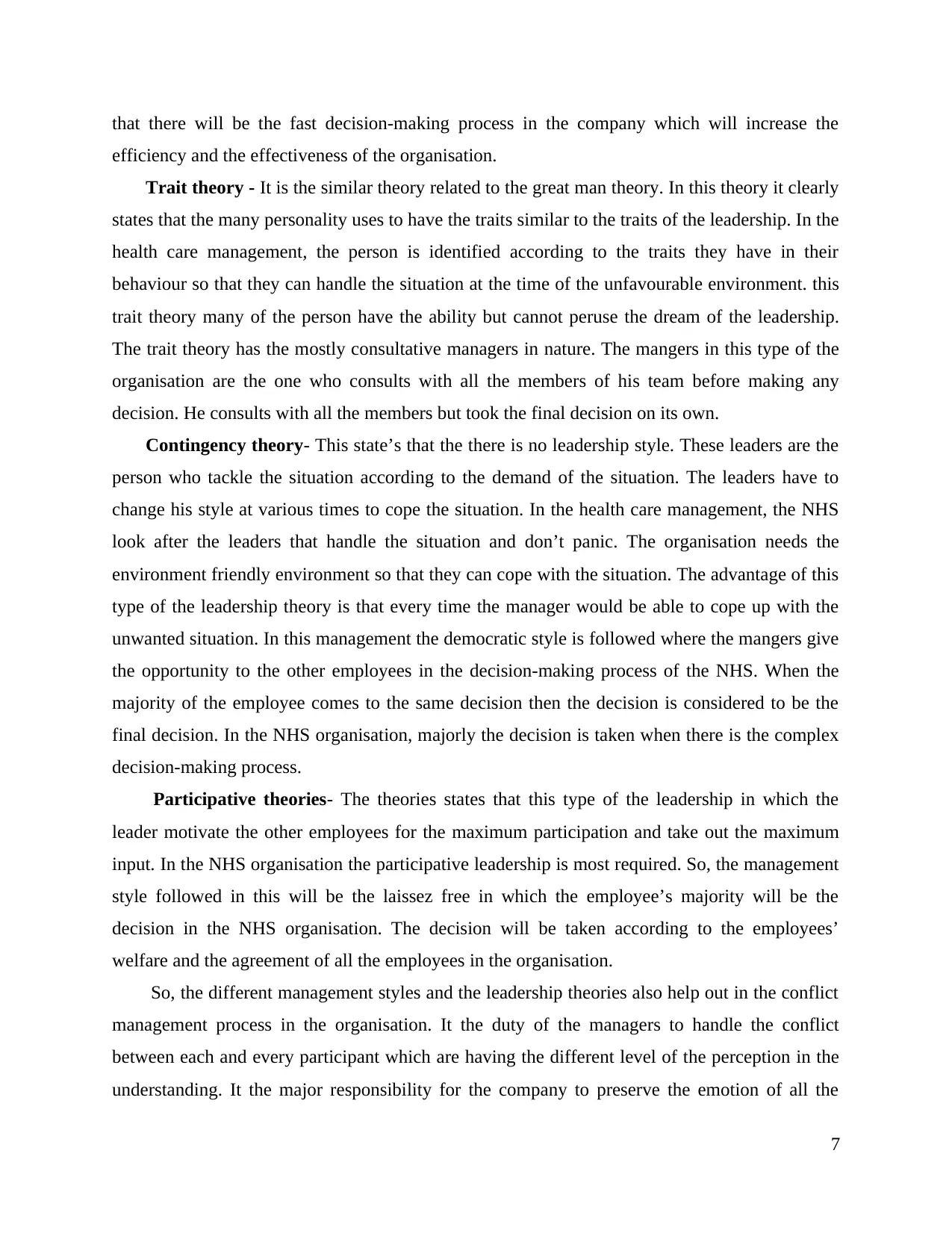
that there will be the fast decision-making process in the company which will increase the
efficiency and the effectiveness of the organisation.
Trait theory - It is the similar theory related to the great man theory. In this theory it clearly
states that the many personality uses to have the traits similar to the traits of the leadership. In the
health care management, the person is identified according to the traits they have in their
behaviour so that they can handle the situation at the time of the unfavourable environment. this
trait theory many of the person have the ability but cannot peruse the dream of the leadership.
The trait theory has the mostly consultative managers in nature. The mangers in this type of the
organisation are the one who consults with all the members of his team before making any
decision. He consults with all the members but took the final decision on its own.
Contingency theory- This state’s that the there is no leadership style. These leaders are the
person who tackle the situation according to the demand of the situation. The leaders have to
change his style at various times to cope the situation. In the health care management, the NHS
look after the leaders that handle the situation and don’t panic. The organisation needs the
environment friendly environment so that they can cope with the situation. The advantage of this
type of the leadership theory is that every time the manager would be able to cope up with the
unwanted situation. In this management the democratic style is followed where the mangers give
the opportunity to the other employees in the decision-making process of the NHS. When the
majority of the employee comes to the same decision then the decision is considered to be the
final decision. In the NHS organisation, majorly the decision is taken when there is the complex
decision-making process.
Participative theories- The theories states that this type of the leadership in which the
leader motivate the other employees for the maximum participation and take out the maximum
input. In the NHS organisation the participative leadership is most required. So, the management
style followed in this will be the laissez free in which the employee’s majority will be the
decision in the NHS organisation. The decision will be taken according to the employees’
welfare and the agreement of all the employees in the organisation.
So, the different management styles and the leadership theories also help out in the conflict
management process in the organisation. It the duty of the managers to handle the conflict
between each and every participant which are having the different level of the perception in the
understanding. It the major responsibility for the company to preserve the emotion of all the
7
efficiency and the effectiveness of the organisation.
Trait theory - It is the similar theory related to the great man theory. In this theory it clearly
states that the many personality uses to have the traits similar to the traits of the leadership. In the
health care management, the person is identified according to the traits they have in their
behaviour so that they can handle the situation at the time of the unfavourable environment. this
trait theory many of the person have the ability but cannot peruse the dream of the leadership.
The trait theory has the mostly consultative managers in nature. The mangers in this type of the
organisation are the one who consults with all the members of his team before making any
decision. He consults with all the members but took the final decision on its own.
Contingency theory- This state’s that the there is no leadership style. These leaders are the
person who tackle the situation according to the demand of the situation. The leaders have to
change his style at various times to cope the situation. In the health care management, the NHS
look after the leaders that handle the situation and don’t panic. The organisation needs the
environment friendly environment so that they can cope with the situation. The advantage of this
type of the leadership theory is that every time the manager would be able to cope up with the
unwanted situation. In this management the democratic style is followed where the mangers give
the opportunity to the other employees in the decision-making process of the NHS. When the
majority of the employee comes to the same decision then the decision is considered to be the
final decision. In the NHS organisation, majorly the decision is taken when there is the complex
decision-making process.
Participative theories- The theories states that this type of the leadership in which the
leader motivate the other employees for the maximum participation and take out the maximum
input. In the NHS organisation the participative leadership is most required. So, the management
style followed in this will be the laissez free in which the employee’s majority will be the
decision in the NHS organisation. The decision will be taken according to the employees’
welfare and the agreement of all the employees in the organisation.
So, the different management styles and the leadership theories also help out in the conflict
management process in the organisation. It the duty of the managers to handle the conflict
between each and every participant which are having the different level of the perception in the
understanding. It the major responsibility for the company to preserve the emotion of all the
7
Paraphrase This Document
Need a fresh take? Get an instant paraphrase of this document with our AI Paraphraser
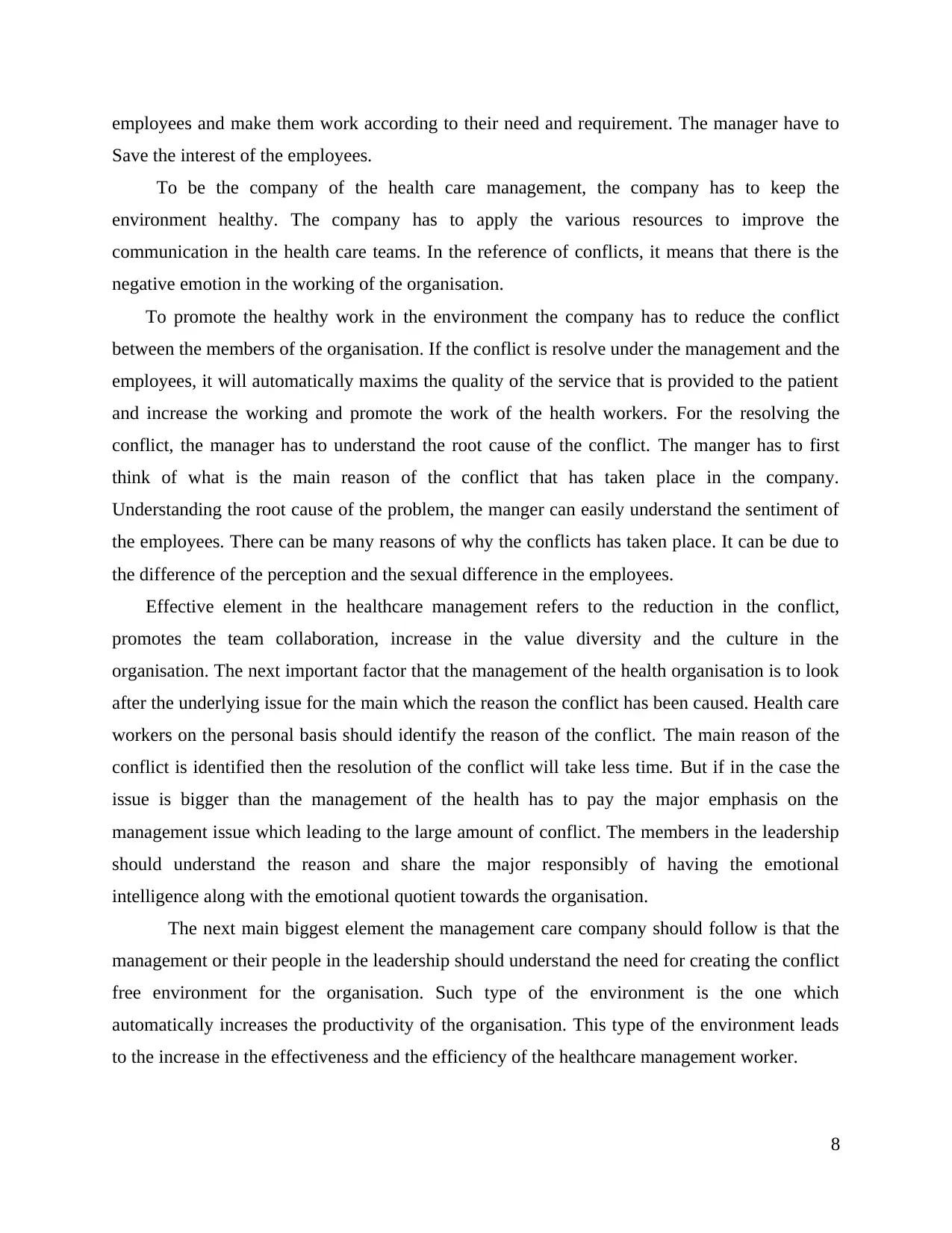
employees and make them work according to their need and requirement. The manager have to
Save the interest of the employees.
To be the company of the health care management, the company has to keep the
environment healthy. The company has to apply the various resources to improve the
communication in the health care teams. In the reference of conflicts, it means that there is the
negative emotion in the working of the organisation.
To promote the healthy work in the environment the company has to reduce the conflict
between the members of the organisation. If the conflict is resolve under the management and the
employees, it will automatically maxims the quality of the service that is provided to the patient
and increase the working and promote the work of the health workers. For the resolving the
conflict, the manager has to understand the root cause of the conflict. The manger has to first
think of what is the main reason of the conflict that has taken place in the company.
Understanding the root cause of the problem, the manger can easily understand the sentiment of
the employees. There can be many reasons of why the conflicts has taken place. It can be due to
the difference of the perception and the sexual difference in the employees.
Effective element in the healthcare management refers to the reduction in the conflict,
promotes the team collaboration, increase in the value diversity and the culture in the
organisation. The next important factor that the management of the health organisation is to look
after the underlying issue for the main which the reason the conflict has been caused. Health care
workers on the personal basis should identify the reason of the conflict. The main reason of the
conflict is identified then the resolution of the conflict will take less time. But if in the case the
issue is bigger than the management of the health has to pay the major emphasis on the
management issue which leading to the large amount of conflict. The members in the leadership
should understand the reason and share the major responsibly of having the emotional
intelligence along with the emotional quotient towards the organisation.
The next main biggest element the management care company should follow is that the
management or their people in the leadership should understand the need for creating the conflict
free environment for the organisation. Such type of the environment is the one which
automatically increases the productivity of the organisation. This type of the environment leads
to the increase in the effectiveness and the efficiency of the healthcare management worker.
8
Save the interest of the employees.
To be the company of the health care management, the company has to keep the
environment healthy. The company has to apply the various resources to improve the
communication in the health care teams. In the reference of conflicts, it means that there is the
negative emotion in the working of the organisation.
To promote the healthy work in the environment the company has to reduce the conflict
between the members of the organisation. If the conflict is resolve under the management and the
employees, it will automatically maxims the quality of the service that is provided to the patient
and increase the working and promote the work of the health workers. For the resolving the
conflict, the manager has to understand the root cause of the conflict. The manger has to first
think of what is the main reason of the conflict that has taken place in the company.
Understanding the root cause of the problem, the manger can easily understand the sentiment of
the employees. There can be many reasons of why the conflicts has taken place. It can be due to
the difference of the perception and the sexual difference in the employees.
Effective element in the healthcare management refers to the reduction in the conflict,
promotes the team collaboration, increase in the value diversity and the culture in the
organisation. The next important factor that the management of the health organisation is to look
after the underlying issue for the main which the reason the conflict has been caused. Health care
workers on the personal basis should identify the reason of the conflict. The main reason of the
conflict is identified then the resolution of the conflict will take less time. But if in the case the
issue is bigger than the management of the health has to pay the major emphasis on the
management issue which leading to the large amount of conflict. The members in the leadership
should understand the reason and share the major responsibly of having the emotional
intelligence along with the emotional quotient towards the organisation.
The next main biggest element the management care company should follow is that the
management or their people in the leadership should understand the need for creating the conflict
free environment for the organisation. Such type of the environment is the one which
automatically increases the productivity of the organisation. This type of the environment leads
to the increase in the effectiveness and the efficiency of the healthcare management worker.
8
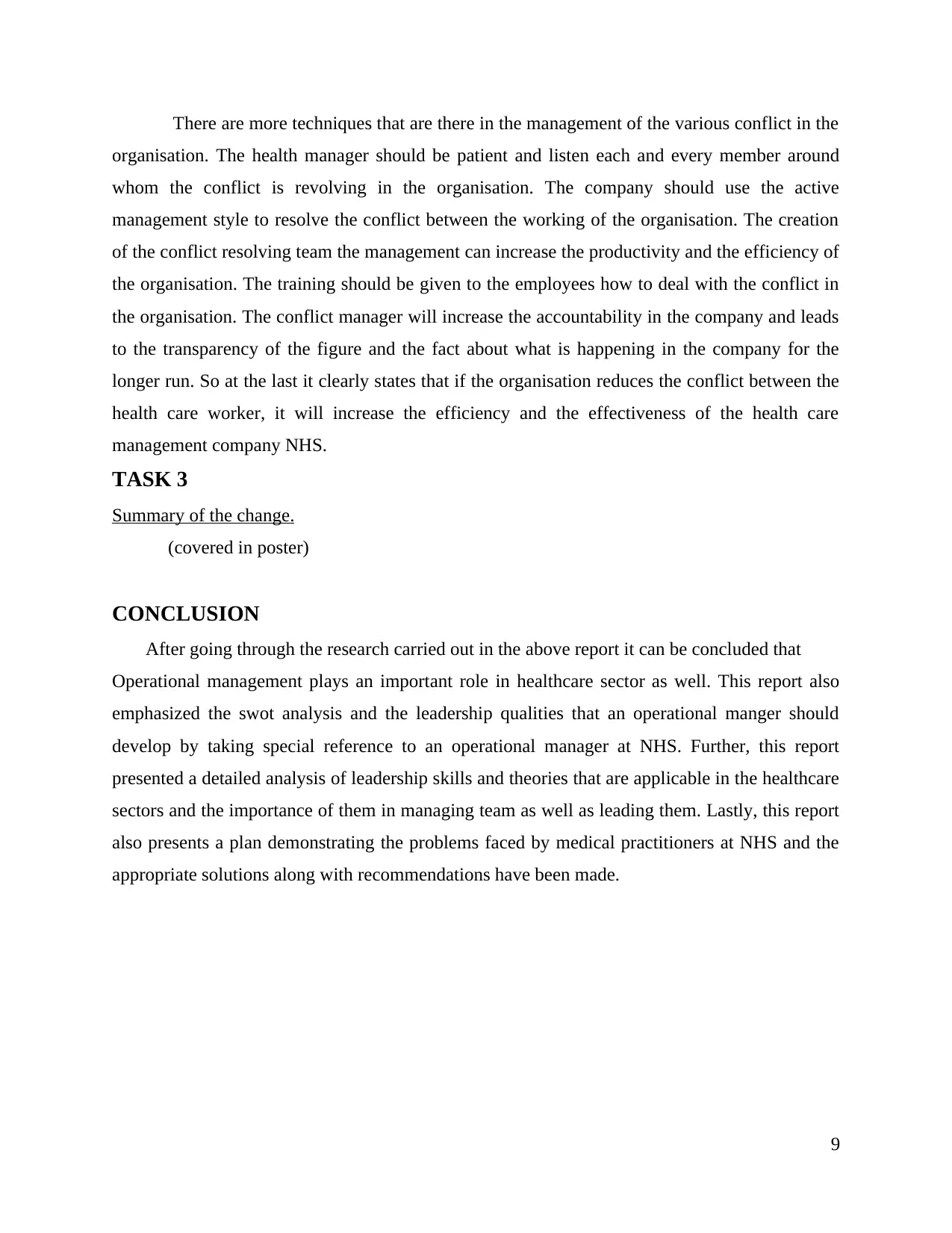
There are more techniques that are there in the management of the various conflict in the
organisation. The health manager should be patient and listen each and every member around
whom the conflict is revolving in the organisation. The company should use the active
management style to resolve the conflict between the working of the organisation. The creation
of the conflict resolving team the management can increase the productivity and the efficiency of
the organisation. The training should be given to the employees how to deal with the conflict in
the organisation. The conflict manager will increase the accountability in the company and leads
to the transparency of the figure and the fact about what is happening in the company for the
longer run. So at the last it clearly states that if the organisation reduces the conflict between the
health care worker, it will increase the efficiency and the effectiveness of the health care
management company NHS.
TASK 3
Summary of the change.
(covered in poster)
CONCLUSION
After going through the research carried out in the above report it can be concluded that
Operational management plays an important role in healthcare sector as well. This report also
emphasized the swot analysis and the leadership qualities that an operational manger should
develop by taking special reference to an operational manager at NHS. Further, this report
presented a detailed analysis of leadership skills and theories that are applicable in the healthcare
sectors and the importance of them in managing team as well as leading them. Lastly, this report
also presents a plan demonstrating the problems faced by medical practitioners at NHS and the
appropriate solutions along with recommendations have been made.
9
organisation. The health manager should be patient and listen each and every member around
whom the conflict is revolving in the organisation. The company should use the active
management style to resolve the conflict between the working of the organisation. The creation
of the conflict resolving team the management can increase the productivity and the efficiency of
the organisation. The training should be given to the employees how to deal with the conflict in
the organisation. The conflict manager will increase the accountability in the company and leads
to the transparency of the figure and the fact about what is happening in the company for the
longer run. So at the last it clearly states that if the organisation reduces the conflict between the
health care worker, it will increase the efficiency and the effectiveness of the health care
management company NHS.
TASK 3
Summary of the change.
(covered in poster)
CONCLUSION
After going through the research carried out in the above report it can be concluded that
Operational management plays an important role in healthcare sector as well. This report also
emphasized the swot analysis and the leadership qualities that an operational manger should
develop by taking special reference to an operational manager at NHS. Further, this report
presented a detailed analysis of leadership skills and theories that are applicable in the healthcare
sectors and the importance of them in managing team as well as leading them. Lastly, this report
also presents a plan demonstrating the problems faced by medical practitioners at NHS and the
appropriate solutions along with recommendations have been made.
9
⊘ This is a preview!⊘
Do you want full access?
Subscribe today to unlock all pages.

Trusted by 1+ million students worldwide
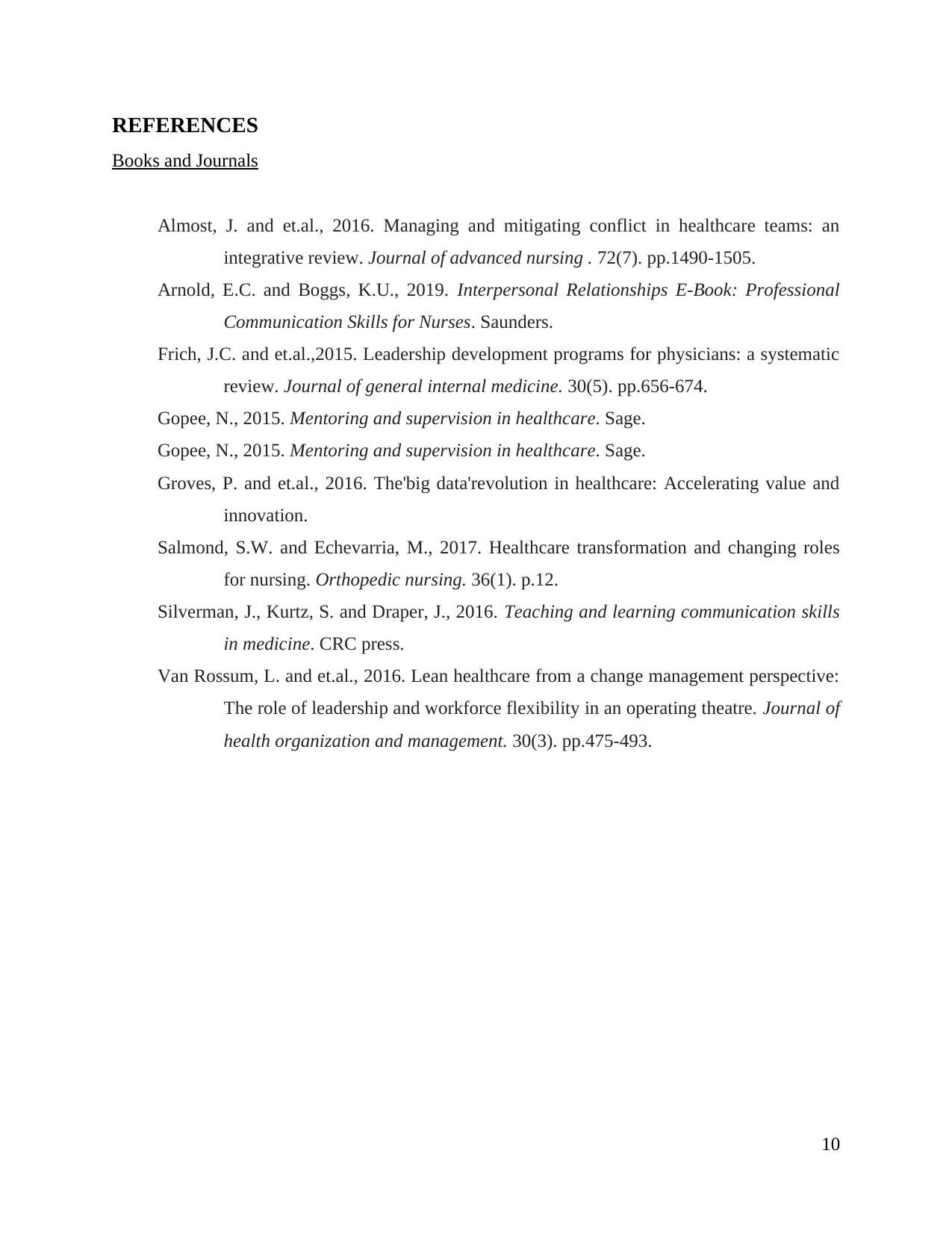
REFERENCES
Books and Journals
Almost, J. and et.al., 2016. Managing and mitigating conflict in healthcare teams: an
integrative review. Journal of advanced nursing . 72(7). pp.1490-1505.
Arnold, E.C. and Boggs, K.U., 2019. Interpersonal Relationships E-Book: Professional
Communication Skills for Nurses. Saunders.
Frich, J.C. and et.al.,2015. Leadership development programs for physicians: a systematic
review. Journal of general internal medicine. 30(5). pp.656-674.
Gopee, N., 2015. Mentoring and supervision in healthcare. Sage.
Gopee, N., 2015. Mentoring and supervision in healthcare. Sage.
Groves, P. and et.al., 2016. The'big data'revolution in healthcare: Accelerating value and
innovation.
Salmond, S.W. and Echevarria, M., 2017. Healthcare transformation and changing roles
for nursing. Orthopedic nursing. 36(1). p.12.
Silverman, J., Kurtz, S. and Draper, J., 2016. Teaching and learning communication skills
in medicine. CRC press.
Van Rossum, L. and et.al., 2016. Lean healthcare from a change management perspective:
The role of leadership and workforce flexibility in an operating theatre. Journal of
health organization and management. 30(3). pp.475-493.
10
Books and Journals
Almost, J. and et.al., 2016. Managing and mitigating conflict in healthcare teams: an
integrative review. Journal of advanced nursing . 72(7). pp.1490-1505.
Arnold, E.C. and Boggs, K.U., 2019. Interpersonal Relationships E-Book: Professional
Communication Skills for Nurses. Saunders.
Frich, J.C. and et.al.,2015. Leadership development programs for physicians: a systematic
review. Journal of general internal medicine. 30(5). pp.656-674.
Gopee, N., 2015. Mentoring and supervision in healthcare. Sage.
Gopee, N., 2015. Mentoring and supervision in healthcare. Sage.
Groves, P. and et.al., 2016. The'big data'revolution in healthcare: Accelerating value and
innovation.
Salmond, S.W. and Echevarria, M., 2017. Healthcare transformation and changing roles
for nursing. Orthopedic nursing. 36(1). p.12.
Silverman, J., Kurtz, S. and Draper, J., 2016. Teaching and learning communication skills
in medicine. CRC press.
Van Rossum, L. and et.al., 2016. Lean healthcare from a change management perspective:
The role of leadership and workforce flexibility in an operating theatre. Journal of
health organization and management. 30(3). pp.475-493.
10
Paraphrase This Document
Need a fresh take? Get an instant paraphrase of this document with our AI Paraphraser

11

12
⊘ This is a preview!⊘
Do you want full access?
Subscribe today to unlock all pages.

Trusted by 1+ million students worldwide
1 out of 13
Related Documents
Your All-in-One AI-Powered Toolkit for Academic Success.
+13062052269
info@desklib.com
Available 24*7 on WhatsApp / Email
![[object Object]](/_next/static/media/star-bottom.7253800d.svg)
Unlock your academic potential
Copyright © 2020–2026 A2Z Services. All Rights Reserved. Developed and managed by ZUCOL.




